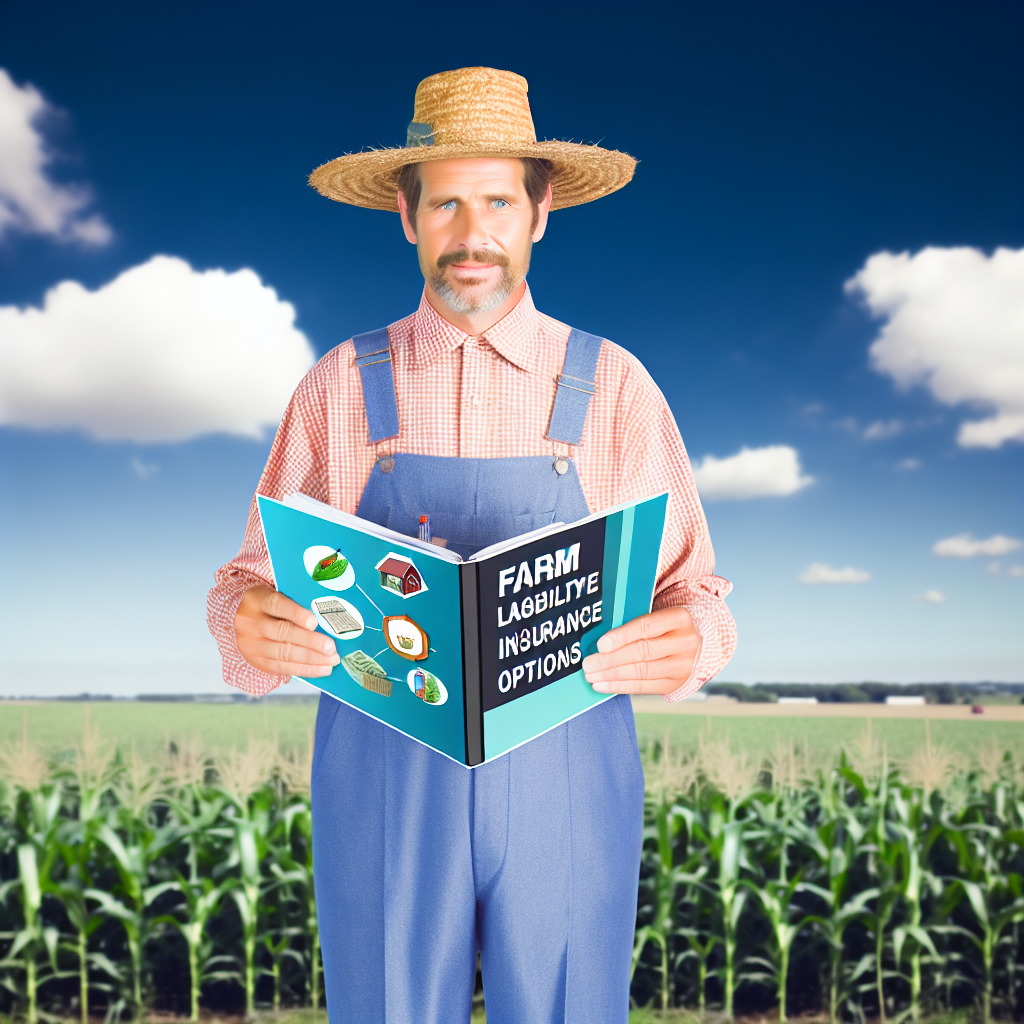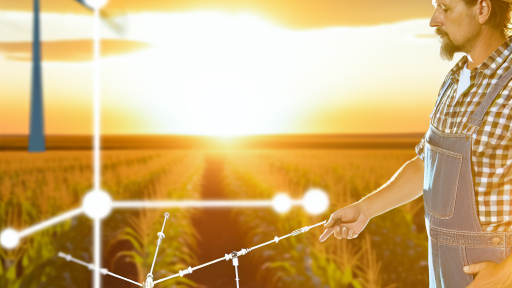Introduction to Farm Liability Insurance
Definition of Farm Liability Insurance
Farm liability insurance protects farmers from financial losses.
This insurance covers claims of injury or property damage.
It helps safeguard the farmer’s assets and livelihood.
Accidents can happen on the farm, leading to costly lawsuits.
Having this insurance provides peace of mind during such events.
Importance of Farm Liability Insurance
Farm liability insurance is crucial for risk management.
Farm operations face unique challenges that require protection.
From livestock injuries to worker accidents, risks are numerous.
This insurance helps mitigate these risks effectively.
Moreover, lenders often require proof of insurance for loans.
Common Coverage Areas
This insurance typically covers bodily injury claims.
It also covers property damage caused during farm operations.
Additionally, it may include coverage for product liability.
Furthermore, some policies cover pollution-related incidents.
Types of Farm Liability Insurance
Several types of farm liability insurance exist.
Transform Your Agribusiness
Unlock your farm's potential with expert advice tailored to your needs. Get actionable steps that drive real results.
Get StartedGeneral liability insurance is the most common type.
This type covers a broad range of potential liabilities.
Additionally, professional liability insurance may be available.
This protects against claims related to negligence or mistakes.
How to Choose the Right Policy
Choosing the right policy requires careful consideration.
First, assess the specific risks associated with your farm.
Next, evaluate different policies and their coverage limits.
It is also wise to compare premiums from various insurers.
Consulting with an insurance agent can provide valuable insights.
Types of Farm Liability Insurance
General Liability Insurance
General liability insurance is essential for all farms.
It protects against claims of bodily injury and property damage.
This coverage includes legal fees and settlements.
Farmers benefit from coverage for accidents on the property.
Moreover, it covers incidents involving non-employees visiting the farm.
Product Liability Insurance
Product liability insurance shields farmers from claims related to their products.
It covers the costs if a product causes injury or damages.
This coverage is vital for farms selling food items.
In fact, it protects against claims stemming from contaminated products.
Furthermore, it can cover legal costs associated with these claims.
Workers’ Compensation Insurance
Workers’ compensation insurance is mandatory in many states.
This insurance provides medical benefits to injured employees.
In return, employees relinquish their right to sue the employer.
Consequently, it helps farmers manage potential legal disputes.
This coverage also supports rehabilitation costs for injured workers.
Showcase Your Farming Business
Publish your professional farming services profile on our blog for a one-time fee of $200 and reach a dedicated audience of farmers and agribusiness owners.
Publish Your ProfileCommercial Auto Insurance
Commercial auto insurance is crucial for farms using vehicles.
This insurance covers vehicles used for farming operations.
It protects against accidents and damages while on the job.
Also, it provides coverage for liability in case of accidents.
Farmers can choose from various coverage options for their vehicles.
Livestock Insurance
Livestock insurance protects farmers from financial loss due to animal loss.
This includes coverage for death, theft, or injury to livestock.
Farmers can insure specific types of livestock, such as cattle or sheep.
Additionally, this insurance can include coverage for attacks by wild animals.
Such protection ensures farmers can recover from unexpected losses.
Crop Insurance
Crop insurance is vital for farmers dependent on crop production.
It offers protection against losses from natural disasters or market fluctuations.
Farmers can opt for multiple-peril crop insurance for broader coverage.
Alternatively, they may choose crop-hail insurance for localized risks.
This coverage helps stabilize income during tough times.
Key Coverage Areas
Bodily Injury Protection
Bodily injury protection is crucial for any farm operation.
This coverage helps pay for medical expenses for injured individuals.
It applies to both employees and visitors who may be harmed.
Additionally, it can cover your legal fees if you face lawsuits.
Farmers must understand their limits and exclusions within this coverage.
Property Damage Coverage
Property damage coverage protects against losses to your farm’s assets.
This includes damage to equipment, buildings, and crops.
It also encompasses damages caused by livestock.
Farmers should document their assets regularly for accurate coverage.
Remember, coverage amounts can vary significantly among providers.
Personal Injury Protection
Personal injury protection covers non-physical damages like defamation.
This includes false accusations or invasions of privacy.
Such coverage helps farmers defend against claims made by third parties.
Farmers should consider tailoring this protection to their needs.
Understanding the nuances of personal injury protection is essential.
Gain More Insights: How Collaborations Boost Sustainable Farm Productivity
Eligibility and Requirements
Who Needs Farm Liability Insurance?
Farm liability insurance protects farmers and their operations.
This coverage is essential for any individual engaged in farming activities.
Farmers operating small or large farms should consider this insurance.
Additionally, agribusiness operators can benefit from having this coverage.
Livestock farmers face specific risks relevant to their operations.
Consequently, farm liability insurance is crucial for both crop and livestock farmers.
Moreover, those who host events on their farms require protection.
Public activities often increase the risk of accidents and injuries.
Thus, having insurance covers potential liabilities in these situations.
Showcase Your Farming Business
Publish your professional farming services profile on our blog for a one-time fee of $200 and reach a dedicated audience of farmers and agribusiness owners.
Publish Your ProfileTypes of Farms that Require Coverage
Different types of farms have varying insurance needs.
For instance, dairy farms often face unique challenges.
Crop farms also benefit significantly from liability coverage.
Equestrian facilities require special attention to liability issues.
Moreover, organic farms must protect against specific risks.
Therefore, the type of farm influences the choice of insurance policies.
Minimum Requirements for Coverage
All farmers should review the required legal liabilities in their area.
Some states mandate specific coverage levels for farms.
Farmers should also assess their operational risks when determining coverage.
Engaging with an insurance agent provides valuable guidance.
The right agent will help customize policies to meet specific needs.
This potentially protects both physical assets and personal liability.
You Might Also Like: Business Continuity Planning for Agribusiness
Factors Affecting Premium Costs
Location
Your farm’s location significantly impacts your premium costs.
Insurance providers assess location risk factors carefully.
For example, farms in flood-prone areas may face higher premiums.
Further, proximity to urban centers often influences rates.
Additionally, regional agricultural practices can play a role.
For instance, fire risks in dry areas can increase costs.
Therefore, understanding your region’s specific risks is essential.
Farm Size
The size of your farm greatly affects insurance premiums.
Generally, larger farms face higher premium costs due to more assets.
More acreage means more machinery and greater liability risks.
However, larger operations might enjoy some economies of scale.
In contrast, smaller farms often benefit from lower individual risks.
Ultimately, size should be a key consideration for coverage.
Risk Assessment
Insurance companies perform thorough risk assessments for each farm.
They evaluate the types of farming operations conducted.
Certain activities, like livestock farming, typically have higher risks.
Moreover, the age and condition of farm equipment impact costs.
Effective risk management practices can lead to lower premiums.
Implementing safety measures may result in discounts over time.
Keep up-to-date records and reviews to demonstrate compliance.
Gain More Insights: Using Technology to Boost Your International Farming Business
Common Exclusions in Farm Liability Policies
Understanding Policy Exclusions
Farm liability insurance offers significant protection, but exclusions exist.
Understanding these exclusions helps you make informed decisions.
It is essential to review your policy thoroughly.
Gaps in coverage can lead to unexpected financial losses.
Exclusion for Intentional Acts
Insurance typically excludes damages from intentional acts.
This includes any deliberate harm to others or property.
Showcase Your Farming Business
Publish your professional farming services profile on our blog for a one-time fee of $200 and reach a dedicated audience of farmers and agribusiness owners.
Publish Your ProfileFor instance, if a farmer vandalizes a neighbor’s property, coverage will not apply.
Contractual Liability Exclusions
Many policies exclude liability assumed under a contract.
This applies unless the liability would exist without the contract.
Consequently, make sure you understand these limitations.
Workers’ Compensation Claims
Farm liability policies do not cover workers’ compensation claims.
This type of insurance specifically addresses employee injuries.
Employers should secure separate workers’ compensation coverage.
Environmental Damage Exclusions
Most farm liability policies exclude coverage for environmental damage.
This includes pollution and contamination incidents.
Farmers must take precautions to avoid such liabilities.
Excluded Types of Animals
Certain animals may not be covered under a farm liability policy.
For instance, exotic or dangerous breeds often have exclusions.
Farmers should identify any specific exclusions related to livestock.
Understanding Coverage Limits
Even if a claim is covered, limits may apply.
Liability coverage often has caps on payouts.
Be sure to evaluate coverage limits in your policy.
Reviewing Your Policy Regularly
Regularly reviewing your policy is a smart practice.
Policy terms can change, and your needs may also evolve.
Contact your insurance agent for periodic reviews.
Staying informed ensures you have adequate coverage.
Gain More Insights: Developing a Marketing Plan for Your Agribusiness

How to Choose the Right Policy
Assess Your Farm’s Specific Needs
Each farm has unique requirements for liability insurance.
Begin by evaluating the specific risks associated with your operations.
Consider the types of crops or livestock you manage.
Additionally, think about the equipment you utilize.
Consult with other farmers to gain insights on common challenges.
Understand Coverage Options
Liability insurance policies vary widely in coverage.
Familiarize yourself with the different types available.
- General liability insurance protects against everyday accidents.
- Product liability insurance covers claims related to your products.
- Professional liability insurance addresses errors in farming advice.
Evaluate each policy carefully to identify what best suits your farm.
Evaluate Insurance Providers
Research multiple insurance providers in your area.
Look for companies that specialize in agricultural insurance.
Assess their reputation and customer service ratings.
Schedule consultations to discuss your options with agents.
Ask about their claims process to gauge their efficiency.
Compare Quotes
Once you’ve narrowed down providers, request quotes.
Compare not only prices but also coverage limits and exclusions.
Ensure you fully understand the terms of each policy.
Your goal is to find comprehensive coverage at a reasonable price.
Consider Additional Endorsements
Many policies allow for optional endorsements for extra protection.
Evaluate whether endorsements fit your specific circumstances.
Showcase Your Farming Business
Publish your professional farming services profile on our blog for a one-time fee of $200 and reach a dedicated audience of farmers and agribusiness owners.
Publish Your Profile- Endorsements like organic coverage protect organic farming.
- Seasonal coverage benefits farms with varying seasonal risks.
- Equipment breakdown coverage can save on repair costs.
Assess the value of these additions before making a decision.
Review Annually
Your farm’s needs may change over time.
Regularly review your liability insurance policy.
Adjust your coverage as necessary to stay adequately protected.
Annual reviews help ensure your insurance evolves with your farm.
Claim Process: Steps to Take When Filing a Claim
Initial Reporting
Report the incident to your insurance provider promptly.
Gather necessary documentation, such as photos and witness statements.
Ensure you provide accurate and complete information to avoid delays.
Claim Form Submission
Obtain the claim form from your insurance company’s website or office.
Complete the claim form carefully, following all instructions.
Attach supporting documents, such as receipts and police reports.
Follow-Up and Communication
Keep in touch with your insurance adjuster throughout the process.
Be prepared to answer additional questions or provide further documentation.
Maintain a record of all communications for your reference.
Assessment and Resolution
The insurance company will review your claim and assess damages.
They may schedule an inspection of the damage or loss.
Once complete, you will receive a decision regarding your claim status.
Receiving Compensation
If your claim is approved, the insurance company will process your payment.
Review the payment to ensure it aligns with the agreed-upon coverage.
If any discrepancies arise, reach out to your adjuster for clarification.
Dispute Resolution
If your claim is denied, you have the right to dispute the decision.
Request a detailed explanation for the denial in writing.
You can appeal the decision or seek mediation if necessary.
Investing in Farm Liability Insurance for Peace of Mind
Understanding Farm Liability Insurance
Farm liability insurance protects against various risks on your farm.
It covers claims from injuries to others, property damage, and much more.
This insurance is essential for any farm operation, big or small.
Types of Coverage Available
Different types of coverage address specific needs on the farm.
General liability insurance covers common incidents and accidents.
Product liability insurance protects against claims related to produce or livestock.
Additionally, pollution liability coverage safeguards against environmental damages.
You can also find coverage for equipment and property damage.
The Benefits of Farm Liability Insurance
Having farm liability insurance offers numerous advantages.
It provides financial protection during lawsuits and claims.
Moreover, it helps maintain your farm’s reputation.
With proper insurance, you can focus on farming activities without fear.
Factors to Consider When Choosing Insurance
Several factors should influence your insurance selection process.
First, evaluate the size and type of your farming operation.
Second, consider the specific risks associated with your farm activities.
Third, compare coverage options from various insurers for better pricing.
Finally, seek advice from an insurance agent knowledgeable in agriculture.
Showcase Your Farming Business
Publish your professional farming services profile on our blog for a one-time fee of $200 and reach a dedicated audience of farmers and agribusiness owners.
Publish Your ProfileWhen to Review Your Coverage
Regularly reviewing your insurance policy ensures adequate protection.
Consider changes in your farm size, operations, or staff.
Significant events, like buying new equipment, may also warrant a review.
Set a schedule, such as annually, to evaluate your coverage needs.
Making the Investment
Investing in farm liability insurance is crucial for peace of mind.
Consider it an essential expense, similar to your farm’s tools and equipment.
With proper coverage, you can handle unexpected incidents more effectively.
Ultimately, peace of mind allows you to focus on growing your business.




